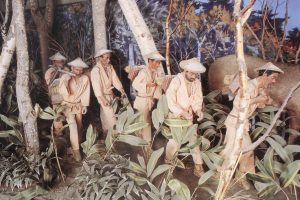
Download
Venue
Deutsches Institut für Japanstudien
Jochi Kioizaka Bldg. 2F
7-1 Kioicho, Chiyoda-ku
Tokyo 102-0094, Japan
Access
Registration Info
The DIJ History and Humanities Study Group is a forum open to scholars working on Japan in any field of the humanities. It is organized by Torsten Weber and Ronald Saladin.
Registration Form
We are sorry! Registration for this event is no longer possible.
Prisons and Forced Labour on Hokkaido
December 7, 2017 / 6:30 P.M.
Pia Jolliffe, University of Oxford
During the Meiji period the Japanese government built five prisons on Hokkaido. The inmates of these prisons largely contributed through agricultural and industrial work to the colonization and development of the northern island. Drawing on historical sources such as prison year books and accounts of eye witnesses, this talk analyses the relation between prisons and settler society during Hokkaido’s colonization process. The research findings evidence how prison labour changed according to changes in local government. After the dissolution of the Development Office (Kaitaku-shi), the local governance of Hokkaido was distributed to three newly established prefectures (ken) Nemuro, Hakodate and Sapporo. During the four years of this so-called three-ken government (1881-1885) convicts mostly worked in agriculture and carpentry. Yet, with the installation of the Hokkaido-cho in 1886, prison labour intensified and prisoners worked mostly in coal and sulfur mines and road construction. Jolliffe´s analysis furthermore suggests a blurring of the boundaries between prisons and settler society. Rather than being enclosed institutions shut away from their environment, Hokkaido´s first prisons served as regional hubs between Tokyo and the north.
Pia Jolliffe is Research and Teaching Associate at the Nissan Institute of Japanese Studies, University of Oxford where she gives tutorials in Modern Japanese History and International Development, in particular theories of (post-)colonialism. She holds a DPhil in International Development (University of Oxford), a DESS in Interdisciplinary Asian Studies (University of Geneva) and a MA in Japanese Studies (University of Vienna). Jolliffe is the author of Gefängnisse und Zwangsarbeit auf der japanischen Nordinsel Hokkaido (LIT, 2016), and Learning, Migration, and Intergenerational Relations. The Karen and the Gift of Education (Palgrave Macmillan, 2016). She is currently working on the expanded English version of her book on Prisons and Forced Labour on Japan´s northern island of Hokkaido (forthcoming with Routledge).